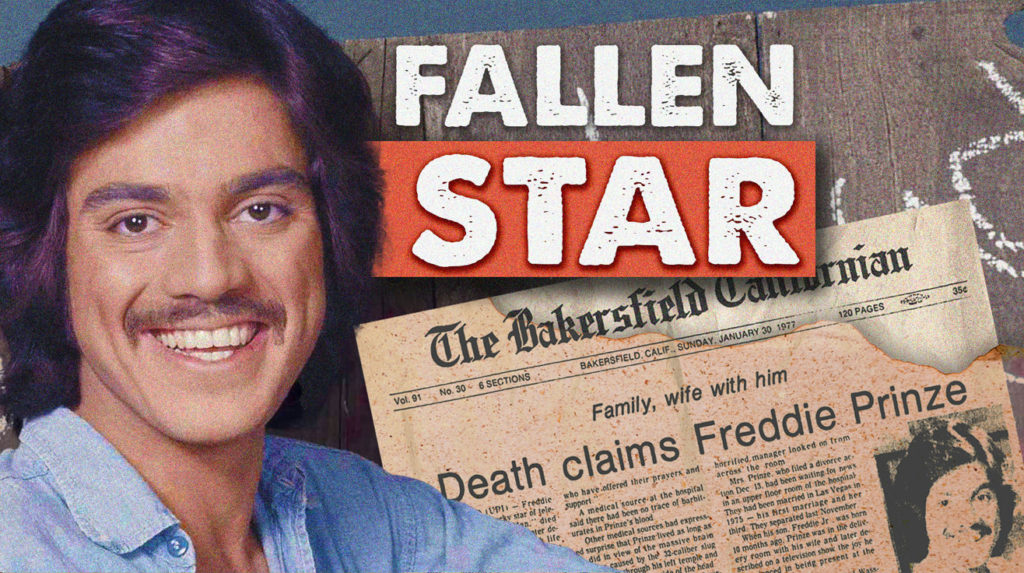
Hollywood loves nothing more than a meteoric rise followed by an equally spectacular crash, and Freddie Prinze’s story fits this pattern. Prinze tore through the entertainment landscape of the mid-1970s like a comet—brilliant, fleeting, and gone before anyone could fully process what they’d witnessed. At 20, he became one of the first Latino stars to crack the mainstream television ceiling, only to exit the stage two years later via a hotel room and a handgun. His journey from Washington Heights kid with asthma to NBC golden boy remains a stark illustration of fame’s psychological impact. When television executives find their next fresh-faced comedy messiah, Prinze’s biography serves as both inspiration and warning.
Early Life and Identity

The kid who would become America’s favorite stereotype-busting comedian entered the world as Frederick Karl Pruetzel in 1954, born to a Puerto Rican mother and German-Hungarian father in Washington Heights—a cultural no-man’s-land for a kid who fit perfectly into neither heritage box. Prinze used the term “Hungarican” for himself, using humor to address the identity complexity that would fuel both his comedy and his personal struggles. Severe childhood asthma further limited his activities, forcing him to develop personality while often watching other children play from the sidelines.
His enrollment at the High School of Performing Arts provided crucial structure for his developing talents. The school channeled his outsider energy into performance, transforming childhood isolation into comedic material. Every stand-up who’s ever transformed personal challenges into humor owes something to this tradition, as Prinze was crafting identity-based comedy while many comics still relied on more conventional material.
Name Change and Image

In 1973, Frederick Pruetzel transformed into Freddie Prinze with deliberate intent. According to biographers, the aspiring comedian initially considered “King” but adopted “Prinze” when he discovered comedian Alan King had already established himself. It represented a calculated career move typical of entertainment industry reinvention.
The “z” in Prinze wasn’t a spelling error but a distinctive branding choice that helped set him apart. This self-creation foreshadowed his career trajectory: ambitious, strategic, and clearly separating himself from his origin story. Before personal branding became standard practice for celebrities, Prinze was already crafting an image designed for mass appeal while distinguishing himself from competitors in the comedy landscape.
The Tonight Show Debut

December 6, 1973, marked Prinze’s breakthrough television appearance. At 19—when most people are still figuring out their path—Prinze was performing on The Tonight Show with Johnny Carson, comedy’s most influential platform. Various biographies suggest Carson personally championed the young comedian’s appearance despite reservations from some on the production team. Prinze quickly won over the audience with his material about his mixed heritage, making an immediate impression.
Carson’s invitation for Prinze to join him for a conversation after his performance represented significant recognition for a debut performer. This television appearance transformed him from comedy club performer to recognized talent almost overnight. Television industry executives, recognizing his potential appeal, quickly moved to capitalize on his charismatic screen presence and relatable comedy style.
Rapid Rise and Pressures

“Chico and the Man” premiered in September 1974 and quickly became a ratings success, with Prinze drawing approximately 40 million viewers weekly. Industry reports confirm his per-episode salary reached about $25,000, placing him among television’s highest-paid young performers. This rapid financial success represented a dramatic life change for the young comedian in just a short time span.
Professional opportunities multiplied: appearances on Dean Martin’s Celebrity Roasts, comedy albums, and substantial purchases of luxury items as documented in biographies like “Freddie Prinze: The Short Life of a Comic Genius.” According to accounts from those close to him, Prinze maintained an exhausting schedule, filming the series while continuing stand-up performances. Entertainment industry demands often prioritize productivity over personal wellbeing, and Prinze’s schedule reflected the intense expectations placed on successful performers during this era.
Substance Abuse

The comedy scene of the 1970s was notoriously associated with drug use, and Prinze’s substance issues reportedly began in his mid-to-late teens, escalating alongside his fame. Biographers have documented his significant cocaine habit, which consumed substantial amounts of his income. He also used Quaaludes, initially prescribed for anxiety symptoms but eventually taken in quantities exceeding therapeutic recommendations.
His mother Maria witnessed her son’s deterioration with growing concern according to family accounts. Biographers who’ve examined Prinze’s story have often described the progression: casual use evolving into dependency, eventually complicating his already challenging situation. His substance use followed a pattern familiar in entertainment history, where the pressures of performance and fame often intersect with drug dependency in destructive ways.
Erratic Behavior

By late 1976, accounts from those who knew Prinze describe increasingly concerning behavior that contrasted with his professional persona. According to several biographers, he developed an intense interest in the Kennedy assassination’s Zapruder film, watching it repeatedly. Friends’ accounts mention disturbing incidents involving firearms, though specific details vary between sources and some accounts remain disputed…. These behaviors indicated significant mental distress that worried his close associates. His mood fluctuations and unpredictable actions gradually distanced him from many in his support network. The entertainment industry of the 1970s lacked adequate mental health resources and awareness, leaving his inner circle ill-equipped to address what appears to have been a deteriorating psychological state during this period.
The John Travolta Incident

As “Welcome Back, Kotter” elevated John Travolta to stardom in 1976, some biographers suggest Prinze developed a fixation with this perceived professional rival. Stories about a confrontation involving Travolta have circulated in Hollywood accounts for years, though the details remain contested. It’s worth noting that Travolta himself denied such an incident in a 2001 interview.
While the specifics remain unclear, multiple biographies reference some form of rivalry or tension during this period. Whether exaggerated in retellings or based on actual events, these accounts reflect the intense competitive pressure Prinze experienced as other young performers gained prominence. The entertainment industry’s tendency to pit rising stars against each other created an environment where such rivalries could easily develop.
Marital Problems

Freddie Prinze married Katherine Cochran in October 1975, creating a union that quickly faced significant challenges. Their son, Freddie Prinze Jr., was born in March 1976, a bright spot amid growing personal difficulties. By December 1976, Katherine filed for divorce, citing Prinze’s substance issues and concerning behavior.
Court documents confirm their relationship deteriorated rapidly, with Katherine expressing serious concerns about Prinze’s stability. The breakdown of his marriage coincided with his already precarious emotional state. The separation removed a potential source of stability during an increasingly difficult period. The collapse of his family life contributed significantly to his mounting personal struggles in his final months.
Death and Aftermath

January 29, 1977, brought Prinze’s life to an end in a Los Angeles hotel room from a self-inflicted gunshot wound at age 22. Earlier that evening, he contacted several friends and family members in what appeared to be farewell conversations. Initially categorized as suicide, a 1983 civil court jury later reclassified his death as accidental, determining his judgment was significantly impaired by medication.
Los Angeles Superior Court records confirm his estate was valued at approximately $600,000 (equivalent to about $3.1 million in 2025), with his mother and son as primary beneficiaries. His passing terminated several valuable contracts, including NBC projects and a reported $1.5 million Caesar’s Palace performance agreement. The entertainment industry, faced with this tragedy involving such a young star, confronted questions about the pressures placed on performers and the limited support systems available.
Legacy

Freddie Prinze created a lasting comedic legacy despite his brief career. His son, Freddie Prinze Jr., has worked to ensure his father’s contributions to comedy remain acknowledged, emphasizing his artistic contributions rather than focusing solely on his tragic end. His influence persists decades after his passing.
Prinze’s observational style and cultural humor influenced many comics who followed. As television’s first young Latino leading man, he helped expand representation in mainstream entertainment. The Paley Center for Media preserves his performances while his Hollywood Walk of Fame star stands as a permanent marker of his significance. Ever notice how the entertainment industry simultaneously celebrates and systematically forgets its cautionary tales? Prinze’s truncated career serves both as inspiration for aspiring performers and as an important reminder about fame’s potential costs—a reminder that bears repeating with each new generation of stars.





















